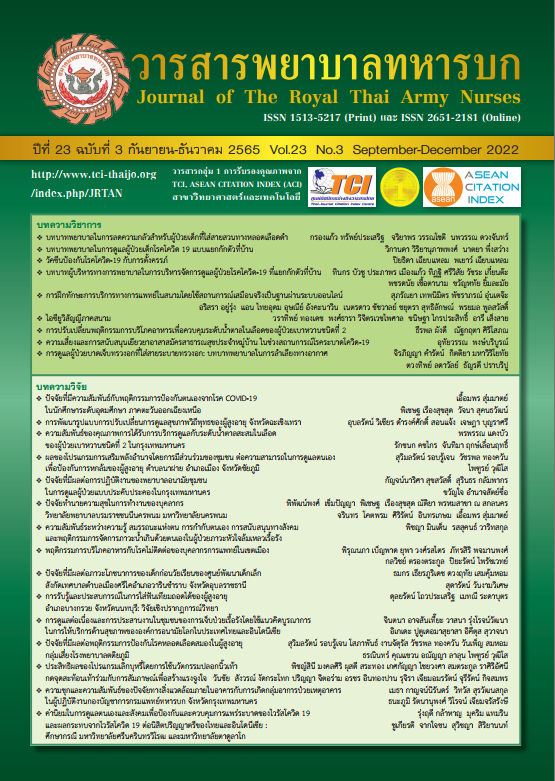Predicting Factors of Happiness at Work of Faculty Staffs of Boromarajonani College of Nursing Nakhon Phanom, Nakhon Phanom University
Keywords:
Happiness, Faculty staffs, Factors predicting happinessAbstract
The objectives of this study were to identify happiness and factors predicting happiness towards working among faculty staff of Boromarajonani College of Nursing Nakhon Phanom, Nakhon Phanom University. The sample consisted of 90 staffs. Data were retrieved by self-administered questionnaires including baseline characteristics and the happiness self-assessment questionnaire (Happinometer). Descriptive Statistics was used to describe happiness level and multiple logistic regression was performed to investigate the relationship between various factors and happiness. The overall prediction property of the final model was also examined using receiver operating characteristics (ROC) curve.
The results showed that the sample group had an overall score of happiness level at 74.6 points which was identified as happy. The mean score of overall happiness was (3.7±SD = 0.4; 74.65%. According to the dimension of happiness, the sample had the highest mean score in the happy family dimension (4.1±0.5; 81.8%) and the lowest score in happy money dimension (3.2±0.8; 64.0%). In addition, factors that significantly predict the happiness at work among faculty staffs were being respected 8.62 (95%CI:1.81-41.08; p = 0.007), and affecting morale 2.48 (95%CI :1.02-6.16; p = 0.050). The area under ROC curve of this final model was 72.77%.
The findings suggest that board of Boromarajonani College of Nursing Nakhon Phanom should support and plan to create happiness projects for staff in the financial dimension and develop factors concerning with being respected and affecting morale that will make the staffs having more happiness.
Downloads
References
Aujirapongpan S. et al. Model for Enhancing Happiness of Personnel in the Autonomous University: A Case Study of Walailak University. Journal of Business Administration. 2019; 8(1): 63-77. (in Thai)
Bura k. Healthy Workplace: Concept Process and The Role of Human Resource Professional. Academic Services Journal, Prince of Songkla University. 2017; 28(3): 169-176. (in Thai)
Punaglom N, Gaseewong W. The Study of the Condition, Problem and Guideline for Developmental Process of Educational Quality Assurance of Boromarajonani College of Nursing Nakhonphanom, Nakhonphanom University. Rommayasan. 2017; 15(2): 171-181. (in Thai)
Kuna N. Happiness at Work among Staff of Tambon Administrative Organizations in Mueang Pattani District, Pattani Province. The Master of Public Administration at Songkla University; 2019. (in Thai)
Plainoi P, Sueprasertsith C. Factors Affecting the Happiness at Work Among Registered Nurses Working for Nakhon Nayok Hospital. The Journal of Faculty of Applied Arts. 2018; 11(1): 92-105. (in Thai)
Pala-ard W. & Lerngvijit N. Predictors Pleasure in the Work of Health Personnel in Satun. KKU Research Journal of Humanities and Social Sciences (Graduate Studies). 2018; 6(3): 20-31. (in Thai)
Herzberg, F., Mausner, B., & Snyderman, B. The Motivation to Work. New York: John Wiley & Son Company Limited; 1959.
Kittisuksathit, S., et al. HAPPINOMETER: The Happiness Self-Assessment. Nakhonpathom Province: Thammada Press Printing Company Limited; 2012. (in Thai)
Walton RE. Criteria for quality of work life. In L. E. Davis, & A. B. Cherns (Eds.). Quality of working life: problems, projects and the state of the art (Vol. 1, Chap. 5, pp. 91- 104). New York: The Free Press, Collier-Macmillan; 1975.
Vanichbuncha K. & Vanichbuncha T. Using SPSS for Windows to analyze data. 31sted. Bangkok: Samlada Publishing Company Limited; 2018. (in Thai)
Thiansawat S. Intrument Development for Nursing Research. Chiang Mai Province: Siam Pimnana Company Limited; 2019. (in Thai)
Chatthong, N., et al. A Management Approach in the Happy Workplace. Case Study: Faculty / Organization in the Public Universities. Chophayom Journal. 2016; 27(1): 131-144. (in Thai)
Sathapornrojana A. & Prajusil K. Relationships Between Family Support, Ethical Climate, and Joy at Work of Professional Nurses, Hospitals Under the Jurisdiction of the Ministry of Public Health, Bangkok Metropolis. Journal of The Royal Thai Army Nurses. 2010; 11(1): 37-42. (in Thai)
Manokarn, C., Jaiyasit, R., & Buaphut, S. A confirmatory Factor of Team Effectiveness for Nursing Instructors Under the Ministry of Public Health. Journal of The Royal Thai Army Nurses. 2020; 21(3): 179-190. (in Thai)
Wannapin T. & Wiserith W. Happiness at Work of Professional Nursing Staffs in an Autonomous University Hospital. Ramathibodi Nursing Journal. 2012; 18(1): 9-23. (in Thai)
Pokasem B. & Chaimongkol N. Factors Predicting Happiness in Work of Nursing Faculties. The Journal of Faculty of Nursing Burapha University. 2014; 22(4): 13-24. (in Thai)
Pachusilpa G. & Worrachitti N. Predicting Factors of Professional Nurses’ Retention in Private Hospitals, Bangkok Metropolis. Journal of The Royal Thai Army Nurses. 2017; 18 (Supplement May - August): 112-120. (in Thai)
Kaptoom, J., et al. Professional Nurses’ Work Life Quality in a Public University Hospital. Journal of The Royal Thai Army Nurses. 2019; 20(3): 353-362. (in Thai)
Downloads
Published
How to Cite
Issue
Section
License
Copyright (c) 2022 Journal of The Royal Thai Army Nurses

This work is licensed under a Creative Commons Attribution-NonCommercial-NoDerivatives 4.0 International License.
บทความหรือข้อคิดเห็นใดใดที่ปรากฏในวารสารพยาบาลทหารบกเป็นวรรณกรรมของผู้เขียน ซึ่งบรรณาธิการหรือสมาคมพยาบาลทหารบก ไม่จำเป็นต้องเห็นด้วย
บทความที่ได้รับการตีพิมพ์เป็นลิขสิทธิ์ของวารสารพยาบาลทหารบก
The ideas and opinions expressed in the Journal of The Royal Thai Army Nurses are those of the authors and not necessarily those
of the editor or Royal Thai Army Nurses Association.






